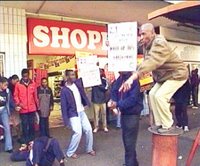Bloody Shirt

For 66 days there's been singing in town, with no end in sight. Shoprite and Checkers grocery store employees throughout South Africa are on strike and they sit, dance and sing outside of the store (although other towns' strikers no longer go to the strike). Early on into the strike workers lined the walk-way into the store, intimidating shoppers. A week into the strike, police and security guards started patrolling the area in front of the store, kicking the strikers across the street. Across the street is not far enough to keep the store and shoppers safe.
Within the store, all is quiet. Black community members are afraid to enter the store because the strikers (or strike supporters) will beat them up. Without 80 percent of their customers, supplies of food aren't ordered, fruit goes bad before it's bought and a store-worth of employees were hired. My mma needed special cooking oil (only available at Shoprite) for my host father. Because she is afraid of entering Shoprite, she asked me to buy it for her.
The store itself isn't safe either. Shoprite Ellisras offered 50,000 rand for information leading to the arrest of persons responsible for recent bomb threats.
Strikes are a new experience for me. In the States, strikes were only in history books and sometimes on the TV in cities far away. Here, strikes, like everything else, become a social commentary. Strike songs and rhetoric are phrased the same way as anti-Apartheid demonstrations. Strikers want the support of the black community and at least in Ellisras, intimidation keeps people from thinking about whether they should support the strike or shop any way. Waving a bloody shirt keeps the blacks away, but it doesn't bring the rainbow nation closer together or help create jobs in an area with 40 percent unemployment.
